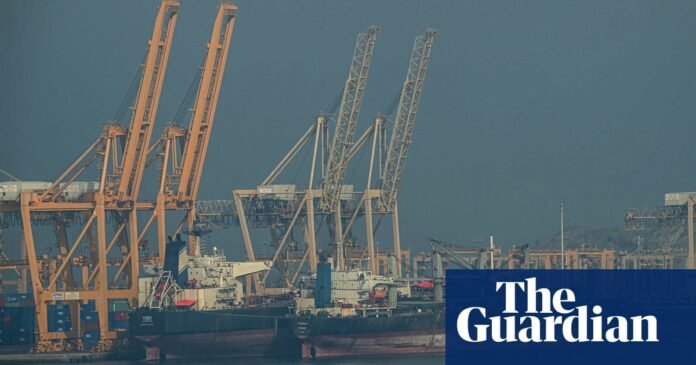Oil prices have pared back losses after a sharp fall triggered by Donald Trump’s declaration of a ceasefire between Israel and Iran was tempered by doubts that the truce would hold.
Donald Trump declared a “complete and total ceasefire” on Tuesday morning and Israel then confirmed it had “agreed” to the proposal.
In response, Brent crude, the global benchmark, fell for a second day, initially down more than 5% to $67.65 (£49.83) a barrel, after tumbling by 7% on Monday.
However, the price traded only 2% lower at $69.38 a barrel later on Tuesday, the lowest since 12 June. Israel’s military said it had detected another Iranian barrage of missiles hours after the start of the ceasefire, which was denied by Iranian media, Reuters reported. Israel’s defence minister, Israel Katz, said it would respond “forcefully”.
Trump said both Israel and Iran violated the ceasefire and he was not happy with either country but especially Israel, Reuters reported. Speaking to reporters before leaving for the Nato summit in The Hague, Trump said Israel “dropped a load of bombs, the likes of which I’ve never seen before” right after agreeing to the deal.
Financial markets have been lifted by news of the ceasefire. In London, the FTSE 100 edged 0.4% higher, while Germany’s Dax rose by almost 2%. In Asia, Japan’s Nikkei climbed by 1.1% and Hong Kong’s Hang Seng gained 2.1%.
Kathleen Brooks, a research director at XTB, said: “While the agreement initially looked solid, this is still a very fluid situation. The IDF [Israel Defense Forces] announced this morning that missiles were fired into Israel from Iran, which caused the oil price to pare losses, as Brent crude edged back towards $70 a barrel.
“Brent crude had rallied nearly 20% in the past month as a war premium was attached to the price of oil, which is now being unwound. However, if there are more signs that the ceasefire is not holding, we could see the oil price resume its uptrend.”
Airline and travel stocks rose on news of the ceasefire, and shares in Air France KLM, British Airways owner IAG, Hungary’s Wizz Air and Germany’s Lufthansa were up between 2% and 10%. Europe’s largest travel operator, Tui, jumped by 8.6%, while Intercontinental Hotels rose by 2% and French hospitality company Accor was up by 4.8%.
Airlines are continuing to halt some flights to the Middle East, due to safety concerns, despite the ceasefire news. BA has suspended all flights to Doha up to and including 25 June, and the budget carrier Wizz Air has cancelled flights to and from the United Arab Emirates until 30 June.
The UK travel company Saga reported that its ocean and river cruises had a strong start to the year, and said it had not been affected by the Middle East conflict. It does not offer cruises to the region and only sells holidays to Jordan and Egypt.
Oil stocks took a hit, with Shell losing 2.9% and BP down by 4.2% in London.
Matt Britzman, a senior equity analyst at Hargreaves Lansdown, said: “Risk assets are back on the menu after President Trump announced a ceasefire has been brokered between Israel and Iran. The details may still be a little up in the air, but global stock markets are pushing higher as a result.
after newsletter promotion
“Iran’s telegraphed retaliation against the US had already been taken as a sign that de-escalation was the most likely path forward, which had helped lift US stocks, and the rally has extended. Traders have arguably been betting on this outcome for a while. Despite the turmoil over the weekend, oil prices were quick to shift into reverse – an early signal that markets were betting on de-escalation sooner rather than later. Iran’s response notably refrained from targeting any oil facilities or the important strait of Hormuz.”
He added: “Lower oil prices are a key component to keep inflation down and something the US Federal Reserve will have one eye on when thinking about whether to cut interest rates at the next meeting in July.”
On Monday, US stocks also rose slightly, with the benchmark S&P 500 up nearly 1% and the Dow Jones industrial average rising 0.9% in New York.
Chris Beauchamp, chief market analyst at the online platform IG, said: “There are still hurdles to navigate, most notably the 8 July deadline for trade deals, but for the moment the market thinks that there will be some kind of fresh extension.
“Slumping oil prices have negated some inflation fears for now, and with two Fed governors calling for rate cuts the overall tone continues to be supportive for risk assets.”
While the Iranian parliament voted to close the strait of Hormuz – through which 20m barrels, more than a fifth of the world’s oil supply, and much of its liquefied gas passes each day – it has so far remained open.





